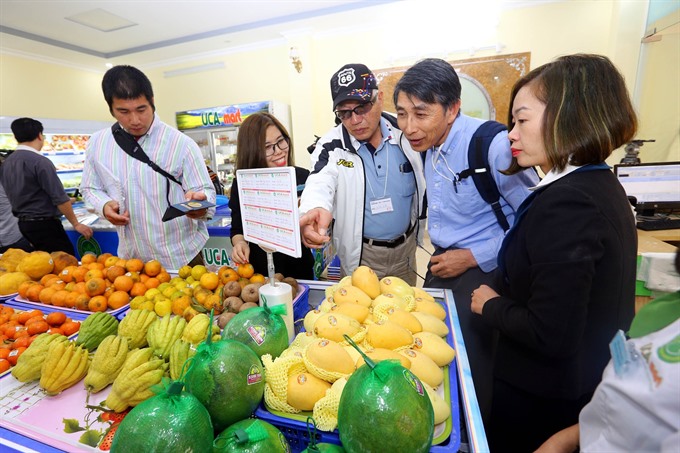 Economy
Economy

The support industry, along with the labour, tourism and agriculture sectors, should become the spearheads in the co-operation between Japan and Việt Nam.
 |
| Japanese firms check out Vietnamese fruit at a kiosk at the Cooperative Union of Agricultural Consumption. - VNA/VNS Photo Danh Lam |
HÀ NỘI — The support industry, along with the labour, tourism and agriculture sectors, should become the spearheads in the co-operation between Japan and Việt Nam.
Chairman of the Việt Nam Chamber of Commerce and Industry (VCCI) Vũ Tiến Lộc made the statement at conference said on Monday.
These sectors had the potential for the two countries to further their bilateral relationship, Lộc said at the Việt Nam – Japan Economic Dialogue held within the framework of a four-day visit by a Japanese business delegation led by Kobayashi Yoichi, chairman of the Japan – Mekong Economic Cooperation Committee.
Việt Nam’s policies for developing its support industry had not reached its full potential, Lộc said, adding that support from Japan in sharing experience and technologies played a significant role in promoting the industry, especially in enabling small and medium sized enterprises to engage in the production chain.
Lộc said the VCCI was willing to work closely with the Japan Chamber of Commerce and Industry (JCCI) to provide support to Japanese firms seeking Vietnamese partners.
Labour was also a potential field for co-operation between the two countries given the Japanese government’s efforts to reform regulations to attract more foreign workers as well as ensuring the rights of foreign workers, Lộc said.
It was estimated that there were around 300,000 Vietnamese working and studying in Japan in 2018, an increase of six times over the past six years, he said.
Lộc said the potential for promoting co-operation in tourism between the two countries was significant, adding that Japan was one of the major markets in Việt Nam’s tourism development strategy by 2020 with a vision to 2030.
Currently, there are direct flight routes connecting Hà Nội and HCM City to major cities in Japan, including Tokyo, Nagoya, Osaka and Fukuoka.
“Trade and investment promotion together with tourism and cultural activities will be a launch pad to boost co-operation between Japan and Việt Nam,” Lộc said.
Việt Nam also wanted further co-operation with Japan in agriculture.
In order to do so, Việt Nam would need to enhance its business climate, improve the capacity of firms, develop economic infrastructure and create mechanisms to facilitate trade and investment, Lộc said.
According to Yoichi, Việt Nam with a population of 100 million, was an attractive destination for foreign investors, including Japan.
Statistics showed that there were around 1,900 Japanese firms investing in Việt Nam with total registered capital of around US$8.6 billion.
Around 70 per cent of them said their business in Việt Nam was efficient and wanted to expand investments, compared to the rate of about 50 per cent from other ASEAN countries.
Yoichi also said that companies from many countries were looking to shift their production from China to Japan, which would present significant opportunities to Việt Nam’s support industry.
According to Shinichiro Shimizu, director of Japan Airlines, the Comprehensive and Progressive Agreement for Trans-Pacific Partnership would open significant opportunities for member countries, through which bilateral relations between Việt Nam and Japan would develop further.
45 years after establishing diplomatic relations, Japan is now the second largest foreign investor, the third largest tourism partner and the fourth largest trade partner of Việt Nam. — VNS




